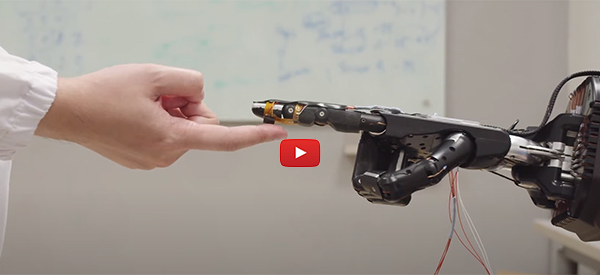
“Human touch”: it’s so central to our lives that it’s a key part of a Michelangelo painting on the Sistine Chapel ceiling. If robots are going to learn to interact with us in natural ways, touch is going to be an important skill for success. Researchers have come up with all sorts of ways to add discrete pressure sensors to robots and powered prosthetics, but these still are no match for human skin.
Until now, possibly. Researchers at the National University of Singapore have created a smart material that they call AiFoam. Instead of containing individual sensors, the entire artificial skin is sensitive to touch. They created it by starting with a polymer similar to Teflon. They added a substance that lowers its surface tension, which allows it to heal itself when cut or damaged. And they mixed in microscopic metal particles to give the material electrical properties.
By controlling the air to material ratio, the research team was able to create a spongy, foam material that can conform to curved surfaces and stretch to twice its original size without damage. It can be used to sense pressure in varying degrees, which will help robots be more adept at handling objects. But perhaps most amazing is something that humans can’t do: sense objects in proximity without touching them. For example, the material is able to sense a human hand from an inch away. This added ability could help make machine/human interactions safer and more natural.
AiFoam could have far-ranging advantages for both robots and powered prosthetics that could provide touch feedback to the wearer.

